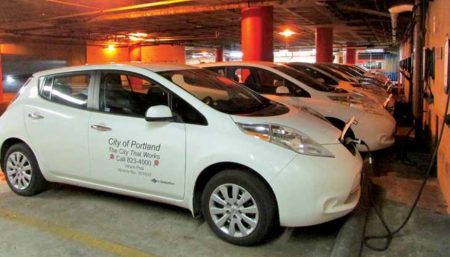December 19, 2016 – A 49-action item plan based on electric first principles has been unanimously adopted by the city council of Portland, Oregon. It covers all city fleet purchases, charging infrastructure, and building policies. The city council has established the following 2020 goals:
- purchase of electric vehicles (EVs) to replace 10,000 gas and diesel-powered vehicles.
- doubling the EV charging infrastructure for municipal and public use.
- increase access to affordable EV transportation for low-income populations.
- improve air quality in low-income population areas through EV implementation.
- add 60 EVs to the city’s fleet of sedans and increase EV usage from 20 to 30%.
- prioritize shared-use EVs including bicycles and buses to reduce the need for personal vehicle ownership.
- encourage electrification of automated vehicles to improve safety and mobility for those who don’t or cannot drive.
The EV strategy is one in a number to help the city reduce carbon emissions by 40% from 1990 levels by 2030 and 80% by 2050. To do this the city estimates between 10 and 15% of non-commercial vehicle traffic on Portland roads will need to be in EVs by 2030. That translates to 50,000 EVs on the city’s roads by then.
Critical to achieving these EV target goals is the building of a charging infrastructure. The city has agreed to increase EV charging in existing buildings, parking facilities and on public streets. EV charging will be incorporated into new building construction. And EV charging clusters will be strategically located throughout Portland.
Car-sharing and bike-sharing programs are part of the plan. In the case of the former the cars will be EVs. Even the bike-share system will include electric bicycles.
The city also intends to continue to research and track all new EV technology developments to allow it to make informed investments and policy decisions for further electrification of the urban transportation system. And the city wants to encourage the EV industry to become part of the industrial fabric of Portland, a place where EV manufacturers and suppliers can develop their products, providing employment opportunities for Portland residents.









